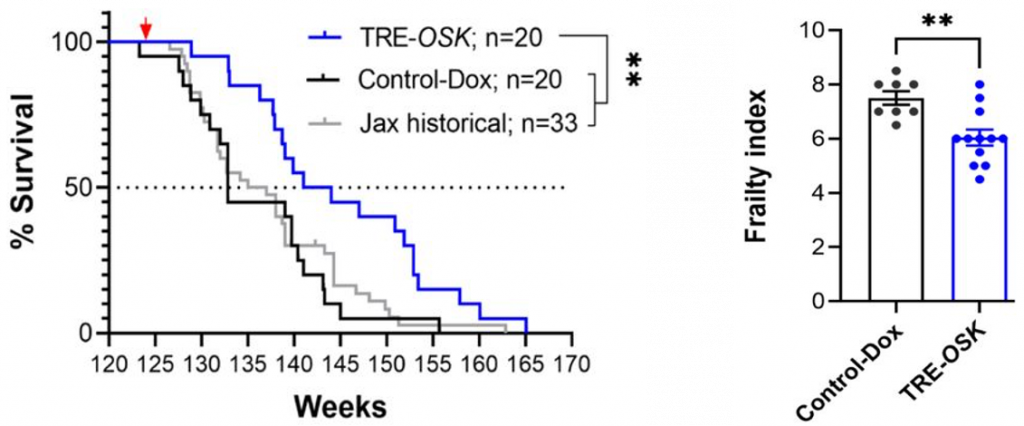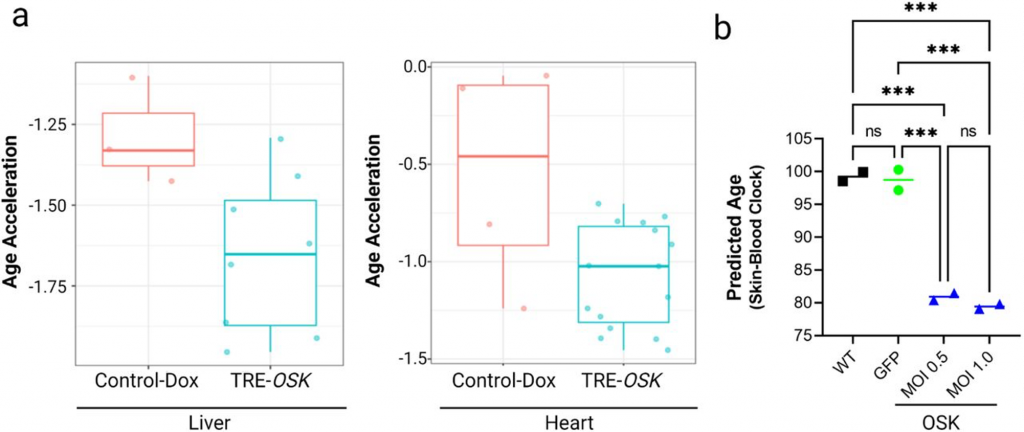Key Points:
- Partial reprogramming — genetically altering cells to revert to a younger state — extends the remaining lifespan of very old mice by 109%.
- Reprogramming reduces frailty — an index scoring age-related deficits.
- Reprogramming lowers the biological age of mouse liver and heart tissue, as well as human skin tissue.
Age reversal refers to restoring an organism’s youth. This includes prolonging the organism’s lifespan and healthspan — the duration of life lived without disease and age-related deficits. One of the more ambitious goals of aging science is to reverse aging in humans, and a new study suggests we are one step closer to doing just that.
In a preprint article published in BioRxiv, researchers from Rejuvenate Bio, a biotechnology company in San Diego, report that gene therapy-mediated partial reprogramming extends lifespan and reverses aging. Macip and colleagues show that reprogramming old mice via gene therapy extends their lifespan and healthspan. They also show that reprogramming reduces the biological age of heart and liver tissue in mice and skin tissue in humans.
“While aging cannot currently be prevented, its impact on life and healthspan can potentially be minimized by interventions that aim to return gene expression networks to optimal function,” says Dr. Noah Davidsohn, senior author and Co-Founder of Rejuvenate Bio.
Genetic Reprogramming Extends Lifespan and Reverses Biological Aging
To determine the effects of age reversal on older mice, Macip and colleagues used 124-week-old mice, equivalent to about 77 human years. These very old mice usually live to 129 weeks (~80 human years). The old mice were injected with partial reprogramming genes (Yamanaka factors) via a viral vector called adeno-associated virus (AAV). Compared to mice that did not receive this gene therapy, reprogrammed mice lived an additional 10 weeks. This corresponded to about a 7% increase in total lifespan and 109% increase in remaining lifespan.

Aging can be measured by age-related health deficits using the frailty index (FI). High FI scores, based on the severity of factors like fur condition, grip strength, hearing loss, and vision loss, reflect a frail state and increased susceptibility to poor health outcomes. Reprogrammed mice showed a reduction in the FI score. Along with improved survival, these findings suggest that reprogramming increases lifespan and healthspan.
Scientists have developed ways to measure biological age, which predicts the risk of death and diseases more accurately than chronological age. Biological age can be determined by analyzing the DNA of different tissues. Macip and colleagues found the biological age of the liver and heart of mice was reduced by reprogramming. Furthermore, the biological age of skin cells from the scalp of a 65-year-old man was also reduced with reprogramming.

“The study results suggest that partial reprogramming could be a potential treatment in the elderly for reversing age-associated diseases and could extend human lifespan,” says Dr. Davidsohn.
Age-Reversing Gene Therapy
Previous studies have shown that partial reprogramming can reverse the aging of younger mice and prematurely aged mice. Reprogramming has also been shown to reverse the age of human skin cells by 30 years. This is the first study to extend the lifespan of elderly mice, making it more translatable to older adults. Additionally, Macip and colleagues use an AAV vector to deliver the reprogramming genes to all tissues of the body. AAV vectors are currently used in clinical trials for other gene therapies. Thus, we may be one step closer to an age-reversing gene therapy for humans.